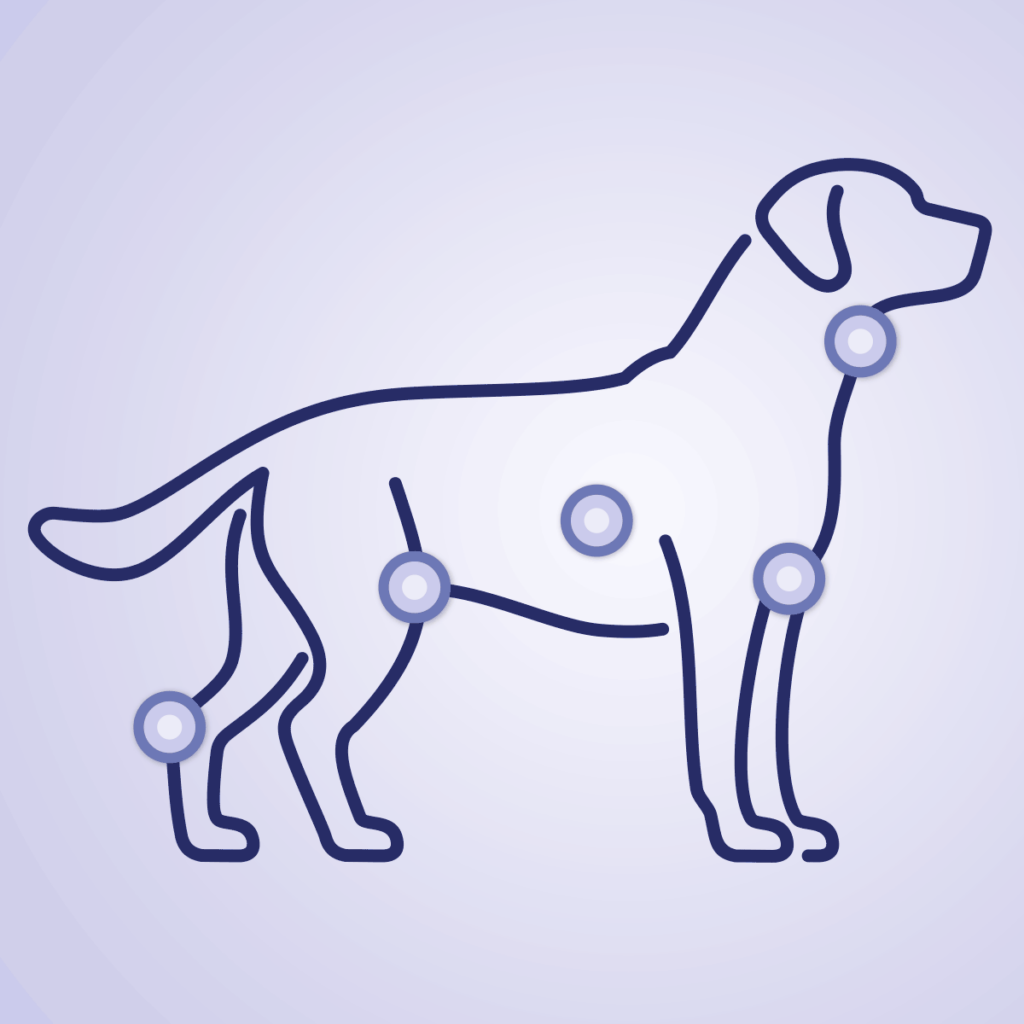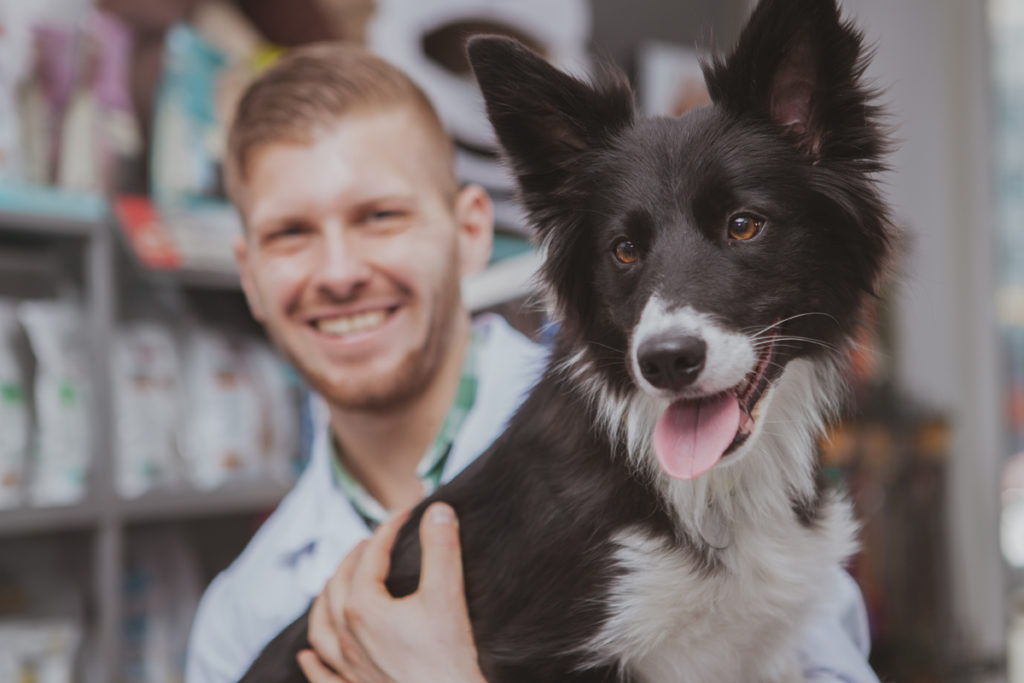Reviewed by: Dr. David Tittle, BVetMed, CertVA, GPCert(WVA&CPM), MRCVS
Lymph nodes, part of the lymphatic system, play an important role in both humans’ and dogs’ immune systems. They help filter and trap harmful substances before they can cause more serious problems in the body. It is important for pet parents to understand the importance of healthy lymph nodes and be able to identify swollen lymph nodes in their dog, which can signal an underlying health issue.
Table of contents
- What are lymph nodes?
- How do lymph nodes work in dogs?
- Importance of a healthy lymphatic system
- Where can lymph nodes be felt in dogs?
- Signs of swollen lymph nodes in dogs
- Possible causes of lymphadenopathy
- Diagnosis
- Treatment options for swollen lymph nodes
- How can you prevent lymphadenopathy?
- Bottom line
What are lymph nodes?
Lymph nodes are small, bean-shaped organs that are part of the lymphatic system, a network of vessels and organs that help remove waste and excess fluids from the body, as well as fight infection and disease. Lymph nodes contain immune cells that can help recognize and fight off foreign invaders like bacteria, viruses, and cancer cells. They are located throughout the body, including the neck, armpit, groin, and abdomen.
How do lymph nodes work in dogs?
The lymphatic system works by collecting and transporting lymph, a clear fluid that contains white blood cells, from various parts of the body to the lymph nodes. The lymph nodes act as filters, trapping and destroying bacteria, viruses, and other harmful substances before they can spread to other parts of the body.
After filtering the lymph, the lymphocytes and macrophages release antibodies and other immune system molecules that help fight off infection and disease. The lymphatic system in dogs is highly effective in protecting the body from harmful substances, making healthy lymph nodes essential for their overall health and wellbeing.
Importance of a healthy lymphatic system
Without healthy lymph nodes, dogs may be more susceptible to infections, diseases, and other health problems, and their ability to fight off these issues may be compromised. Dogs can develop lymph node enlargement or lymphadenopathy, which can be a sign of infection, inflammation, or cancer. Lymphadenopathy can occur in one or multiple lymph nodes and may cause discomfort, pain, and other symptoms.

Where can lymph nodes be felt in dogs?
Lymph nodes can be felt in several areas of a dog’s body. In general, lymph nodes are located in groups, and they can be felt as small, round, or bean-shaped structures under the skin. Some of the most common areas where lymph nodes can be felt in dogs include:
- Neck: Lymph nodes in the neck can be felt on either side of the windpipe, just below the jawline.
- Armpits: Lymph nodes in the armpits can be felt near the front legs, close to the body’s trunk.
- Groin: Lymph nodes in the groin can be felt on either side of the genital area.
- Behind the knees: Lymph nodes behind the knees can be felt on the back of the hind legs.
- Abdomen: Lymph nodes in the abdomen can be felt on either side of the spine, just above the hipbones.
It’s essential to note that lymph nodes in dogs vary in size, and not all lymph nodes can be felt easily. Consult your veterinarian to identify and examine any enlarged lymph nodes to determine the underlying cause and necessary treatment.
Signs of swollen lymph nodes in dogs
Because lymphadenopathy in dogs can be an indication of an underlying health issue, it’s essential for pet owners to know the signs and symptoms of swollen lymph nodes to identify the problem early and seek veterinary care promptly. Some of the signs of swollen lymph nodes in dogs include:
- Enlarged lymph nodes that can be felt or seen under the skin
- Discomfort when touched
- Change in the shape or texture of the lymph nodes and surrounding area
- Fever
- Loss of appetite and weight loss
- Lethargy
- Coughing, sneezing, or difficulty breathing
If your dog shows any of these symptoms, it’s essential to seek veterinary care right away. Early diagnosis and treatment can improve the prognosis for dogs with swollen lymph nodes and prevent further health complications.
Possible causes of lymphadenopathy
Swollen lymph nodes in dogs can be caused by several underlying health issues, including:
- Infections – Bacterial, viral, and fungal infections can cause swollen lymph nodes in dogs. Infections such as Lyme disease, ehrlichiosis, and parvovirus can cause lymphadenopathy.
- Allergies – Allergic reactions, including food allergies, environmental allergies, and flea allergies, can lead to swollen lymph nodes in dogs.
- Immune-mediated diseases – Autoimmune diseases such as lupus, immune-mediated hemolytic anemia (IMHA), and polyarthritis can cause lymphadenopathy.
- Cancer – Cancerous tumors can cause lymphadenopathy in dogs. Lymphoma, a cancer of the lymphatic system, is a common cause of swollen lymph nodes in dogs.
- Dental disease – Advanced dental disease, such as periodontal disease, can cause bacteria to enter the bloodstream, leading to swollen lymph nodes.
- Trauma – Trauma, such as a bite wound or injury, can cause lymphadenopathy in the affected area.
- Medications – Certain medications, including antibiotics and anticonvulsants, can cause lymph node enlargement in dogs.
Diagnosis
Early detection and treatment can prevent further health complications and improve the dog’s overall health and well-being, so it is essential for pet parents to seek veterinary care for their dog if they suspect their furry friend is experiencing swollen lymph nodes. When a dog is experiencing swollen lymph nodes, the veterinarian will perform a series of diagnostic tests to determine the underlying cause of the issue.
Typically, one of the first steps is a thorough physical examination of the affected area to assess the size, shape, and texture of the lymph nodes. The veterinarian may also perform blood tests, including a complete blood count (CBC) and a biochemical profile, to evaluate the overall health of the dog and rule out any other underlying health issues.
Diagnostic imaging, such as X-rays or ultrasound, may also be used to assess the lymph nodes’ size and shape and identify any abnormalities in the surrounding tissues. In some cases, a fine needle aspirate (FNA) or biopsy of the lymph nodes may be performed to collect a sample of cells for further evaluation under a microscope.
If cancer is suspected, your veterinarian may also recommend additional tests, such as a CT scan, MRI, or lymph node biopsy, to determine the type and extent of cancer present. Identifying the underlying cause of the swollen lymph nodes is crucial in developing an effective treatment plan to manage the condition and improve the dog’s prognosis.
Treatment options for swollen lymph nodes
Treatment of your dog’s swollen lymph nodes depends on the underlying cause of the condition. In some cases, the swollen lymph nodes may resolve on their own once the underlying issue is addressed. However, in other cases, more aggressive treatment may be necessary. Some of the possible treatment options for swollen lymph nodes in dogs include:
- Antibiotics – If a bacterial infection is the underlying cause of swollen lymph nodes, antibiotics may be prescribed to treat the infection and reduce lymph node swelling.
- Anti-inflammatory medications – Nonsteroidal anti-inflammatory drugs (NSAIDs) may be prescribed to reduce inflammation and swelling in the lymph nodes.
- Immunosuppressive drugs – If the swollen lymph nodes are caused by an autoimmune disease, immunosuppressive drugs may be prescribed to suppress the immune system and reduce lymph node swelling.
- Chemotherapy – If the swollen lymph nodes are caused by cancer, chemotherapy may be recommended to shrink the tumor and reduce lymph node swelling.
- Surgery – In some cases, surgical removal of the affected lymph nodes may be necessary, especially if cancer is present.
- Supportive care – In addition to medical treatment, supportive care such as rest, a balanced diet, and adequate hydration may be recommended to promote overall health and well-being.
Fortunately, with proper treatment and care, most dogs with swollen lymph nodes can recover and resume their normal activities.
How can you prevent lymphadenopathy?
While not all cases of swollen lymph nodes can be prevented, there are several steps dog owners can take to reduce the risk of their dogs developing this condition, including:
- Keep up with vaccinations – Vaccinating your dog against infectious diseases can help reduce the risk of developing infections that can cause swollen lymph nodes.
- Regular veterinary check-ups – Scheduling regular check-ups with your veterinarian can help detect underlying health issues early and treat them before they progress.
- Good dental hygiene – Maintaining good dental hygiene can prevent bacteria from entering the bloodstream and causing infections that lead to swollen lymph nodes.
- Regular exercise and a balanced diet – Keeping your dog physically active and providing a balanced diet can help boost their immune system and overall health.
- Flea and tick prevention – Regularly using flea and tick prevention products can help prevent allergies and infections that can cause swollen lymph nodes.
- Limit exposure to toxins – Limiting your dog’s exposure to toxins, such as cleaning products, pesticides, and other chemicals, can reduce the risk of developing cancer and other health issues that can cause swollen lymph nodes.
Bottom line
Lymph nodes play a critical role in the functioning of the lymphatic system in dogs, acting as filters for harmful substances and helping to fight off infections and diseases. Swollen lymph nodes can signal underlying health issues, ranging from infections to cancer, and require prompt veterinary attention. By understanding the importance of lymph nodes in dogs and taking preventative measures, dog owners can help ensure their pets live healthy, happy lives.








